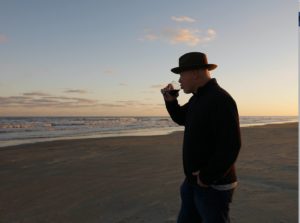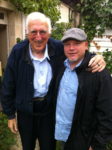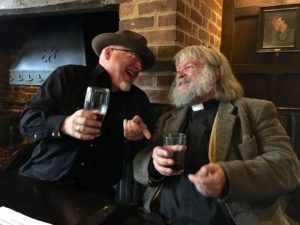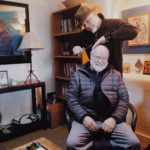Travis Reed is a filmmaker and the founder of The Work of the People website, which is home to literally hundreds of beautiful short films that he has created. His films showcase the ideas and work of theologians, writers, musicians, artists and poets, and bring a thoughtful, inclusive and wide-ranging Christian perspective to viewers. He continues to add new films all the time, and his website is now a rich treasure-trove of exceptional material for churches, small groups, intentional communities, or anyone seeking to be refuelled, challenged and inspired.
Subscribers to the website are treated to filmed interviews with interesting folks such as Parker Palmer, Walter Brueggemann, Richard Rohr, N.T. Wright, Cynthia Bourgeault, and Shane Claiborne, to name but a few. It also offers up short films that are a visual liturgy of prayers, songs, poems and music, for contemplation and worship. The literal definition of the word liturgy is “the work of the people,” which is where the website gets its name. Richard Rohr writes, “Travis represents a new era of honest and wonder-filled Christianity, that is indeed of the people, and not from the usual company men.”
Travis Reed recently put pen to paper to share the remarkable story of his journey, and the many important (and often unexpected) lessons he learned along the way.
I don’t have any credentials…I once managed to get 13 moving violations in 12 months though, and I have credits at a handful of junior colleges sprinkled across Northern California.
I was kicked out of the Army. I sold copy machines for three days, and incontinence and feminine hygiene products for six months.
I have neither a theology degree nor an arts degree—and I’ve never been to film school. I am, by every rational measure, unqualified for most everything.
Fortunately, the Kingdom of God isn’t a rational place—it’s absolutely irrational, in fact. It’s upside down.
For most of my life I bought into the story from the voices around me that being ‘uncredentialed’ informed my value. But as it turns out, my lack of credentials were my credentials – because in God’s Kingdom, the uncredentialed are God’s preferred conduit of the upside-down power of love and grace.
I thought I’d offer up a little bit about my journey. It’s an honour to serve The Work of the People community, and collaborate with others who, I’ve got to admit, know a lot more than I do. And honestly…all I can do is pass on what’s been passed on to me.
Everything I have learned was received by sitting at the table with people who remind me time and again that I’m not a powerless combatant trying to win (regardless of the cost), but an empowered co-creator contributing to the soil of life while surrendering as an embedded seed willing to grow.
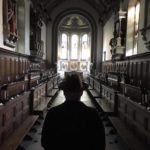 A little backstory…I was saved (the first of many, many rebirths) after I had an audible conversation with God in my room (and hearing U2’s song Hawkmoon 269 off their Rattle and Hum album. Longer story.) After that, I tracked down a church and started going. This was a good and necessary part of my journey. The structure was an oasis after being raised to new life in Jesus. Unfortunately (or fortunately, depending on how you look at it), there is a type of growth that only comes from the desert.
A little backstory…I was saved (the first of many, many rebirths) after I had an audible conversation with God in my room (and hearing U2’s song Hawkmoon 269 off their Rattle and Hum album. Longer story.) After that, I tracked down a church and started going. This was a good and necessary part of my journey. The structure was an oasis after being raised to new life in Jesus. Unfortunately (or fortunately, depending on how you look at it), there is a type of growth that only comes from the desert.
Here’s what Wendell Berry says about change:
“If change is to come, then, it will have to come from the outside. It will have to come from the margins…this sort of change is a dominant theme of our tradition, whose “central figures” have often worked their way inward from the margins. It was the desert, not the temple, that gave us the prophets…”1
The world sees the desert as an unsustainable dry wasteland, a place for the uncredentialed. But it is in desert-like settings that God grows us into our humanity.
Often, voices of authority from within good and necessary church structures advised against my desert journey. The advice was reasonable, and perhaps even loving from their viewpoint, but it came from within structures that understand the world in a particular way. These structures excelled at job descriptions, but weren’t as good at poetry. They could execute management techniques, but weren’t as good at dancing life.
I only offer this tidbit to let you know that when you get called into the desert, people may warn you against it. Perhaps they are dependent on the system to feel safe. Someone choosing to embrace the unknown—virtually heading for the fire escape—raises all sorts of questions they’d prefer to never ask or answer.
They may want to remind you of the “vision”, and to not lose sight of it. It is my hope that when this happens you will be clear enough to recognize whose lens you are being asked to see through. It’s been my experience that many faith communities aren’t inclined to send people on risky desert journeys.
So, to make my long story as short as possible, I was called to a journey of discovery outside of my oasis and into transformational sands.
I’ve filmed with hundreds of saints and sinners around the Kingdom who’ve all stirred my imagination and taught me to breathe in Grace and Love, but I’ll just mention a few foundational conversation partners…
One of the first friends I made in the desert was a Jesus freak named Claudio Oliver from Brazil. I made one of my first films, Friendship Trips, with Claudio. He suggested I not do a mission trip, but do a friendship trip. He taught me that buildings come and go, but friendships are eternal. He taught me that poverty is lack of friendship.
Friendship Trips, with Claudio Oliver (3:53):
After being at the table with Claudio, I couldn’t go back to “normal.” I knew that from then on, whatever The Work of the People was going to become, I couldn’t chase power. I had to go table to table, seeking Jesus’ friends. I knew I needed to be continually saved, and it was friendship that would save me.
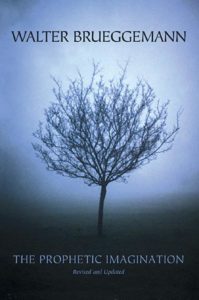 A friend introduced me to Walter Brueggemann’s work, and a book called Prophetic Imagination. Walter taught me about the “juice of emancipation” and that we don’t owe Pharaoh anything. He introduced me to the idea of “right relationship” and that justice didn’t just mean retribution, it also meant restoration–and that the juice of emancipation came from stitching relationships back together. That manna is the real wonder bread. That true Kingdom discovery and transformation experience is a dance, not a systems problem to be solved through middle management. He helped me see that being successful or not successful is different than being formed or not formed, and that inspiration is different from wisdom. He introduced me to the poetic, and showed me that wisdom isn’t like a how-to book; it’s rich and deep and beautiful like a great steak and good bottle of red wine.
A friend introduced me to Walter Brueggemann’s work, and a book called Prophetic Imagination. Walter taught me about the “juice of emancipation” and that we don’t owe Pharaoh anything. He introduced me to the idea of “right relationship” and that justice didn’t just mean retribution, it also meant restoration–and that the juice of emancipation came from stitching relationships back together. That manna is the real wonder bread. That true Kingdom discovery and transformation experience is a dance, not a systems problem to be solved through middle management. He helped me see that being successful or not successful is different than being formed or not formed, and that inspiration is different from wisdom. He introduced me to the poetic, and showed me that wisdom isn’t like a how-to book; it’s rich and deep and beautiful like a great steak and good bottle of red wine.
A friend who was crawling through a dark time in his life introduced me to an author he was reading at the time named Jean Vanier. I went to film with Jean at L’Arche, north of Paris. L’Arche is a community where people with mental disabilities live with people who don’t. It’s that simple. L’Arche has homes in many countries, empowered through weakness…a community of love. It is a community that has power by giving up power; a place of daring friendships, where the “credentialed” and uncredentialed cross over to meet and listen and grow through deep communion with each other and God.
Jean taught me that growth is measured by the capacity to be wounded, and looks like Jesus on the cross. He taught me to stay weak, not strong. You can’t intellectually make sense of it, but you can be shaped and formed into it.
Jean told me about his friend Parker Palmer and that I had to meet with him, so soon after leaving France, I showed up at Parker’s front door. Parker has taught me you have to go into the darkness, not around it. He taught me that “you gotta do what you can’t not do.” Simple, but really big.
Into the Dark, with Parker Palmer (5:39):
Parker also taught me that it is important to have courage to hold space for your own voice while helping other people find theirs.
As I continued to live table to table, all of these experiences worked their way into my soul. I started to see that power is good for combat, but not good for co-creation.
I started to understand that you can’t duct tape fruit to a tree and expect a healthy feast…that we learn and grow from the inside out….that success is kind of easy, but growing fruit and throwing legit banquets are hard.
I thought I was filming theologians, but I was growing friends.
Juan Hernández Pico SJ was a friend and collaborator of Archbishop Oscar Romero. Romero risked losing his power and credentials to speak out against poverty, social injustice, assassinations and torture. In 1980, Romero was assassinated while offering Mass in the chapel of the Hospital of Divine Providence in El Salvador.
Recently I talked to Father Pico in a garden that was also the burial site of many of his murdered and tortured friends. I was filming with my back to the garden when I asked Father Pico what salvation was and where he sees signs of resurrection. He looked into the garden where red bloodstains were now roses, and said, “Friendship.”
Friendship is salvation.
Friendship Salvation, with Juan Hernández Pico SJ (5:10):
The weight of what Fr. Pico said confirmed so much of what I’ve learned from the folks who have offered me a hand up, and set me off on the dangerous and life-giving journey of becoming myself.
They remind me I have to go INTO the darkness, not around it, and that pain given voice is pain that’s empowered. That weakness is strength, and growth lies in my capacity to be wounded and willing.
They remind me to be still and listen. That you don’t owe Pharaoh anything. That nothing grows in the soil of power.
They remind me that where there is friendship, there is communion. That the uncredentialed are not only invited to the table, but are honoured guests.
They remind me that life comes from death. Real fruit grows from being planted in ripe compost. Real fruit needs nurturing, which calls for investments of time. It can be challenging, but anything good is challenging. People’s hearts don’t get nourished by fake fruit.
Soil is made of layers of decomposed dead things. When our “spiritual” soil is made of composted layers of a daily dying to power, it becomes the kind of soil that can sustain growth. That growth leads to a capacity for patient co-creation…which eventually leads to sweet, sweet fruit.
As long as you live out of these upside-down mysteries, what you do will matter.
Sit at the table together; pass on what you receive. That’s it. It’s that simple, and that complicated. It’s that beautiful, and that scary.
It has brought me to this affirmation, equally simple and complicated, equally beautiful and scary: I don’t want to win. I want to grow.
- Wendell Berry, The Unsettling of America: Culture and Agriculture; Counterpoint Press; Berkeley, CA; 3rd revised edition 2004; (first published 1977) pg. 131.


